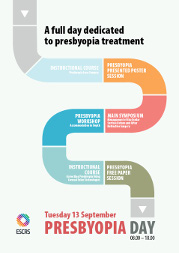Posters
Waterbed of liquefied cortical layer causing sudden visual decline
Poster Details
First Author: P. Gireesh INDIA
Co Author(s): M. Nath S. Bandari
Abstract Details
Purpose:
There are many causes of sudden loss of vision. We present a series of cases with only a posterior layer of liquefied cortical cataract causing sudden visual decline
Setting:
the surgery and imaging done at the same hospital
Methods:
Prospective review of 9 patients with sudden onset of painless decline in vision. Patient demographics, detailed clinical history, best corrected vision, detailed slit-lamp biomicroscopy, anterior segment OCT (AS-OCT) and ultrasonography (USG) B-Scan was done. All underwent uneventful phacoemulsification with intra ocular lens implantation in routine manner. Postoperative evaluation was done.
Results:
The series included 9 eyes of 9 patients, 44.5% females and 55.5% males. Mean duration of reported visual decline was 3.11 days. Best corrected vision ranged from 1/2/60 to 6/18. All had cortical cataract with a layer of opalescent liquid collection in posterior subcapsular space. Rest of the lens was relatively clear with nuclear sclerosis ranging from grade 1 to 3. Same was verified using AS-OCT and USG B-Scan. 55.5% had Diabetes Mellitus (DM). Relative risk of cortical cataract to DM, causing liquefaction was 1.8:1. Post-operatively all had vision of 6/9 or better. No complication occurred intra-operatively or post-operatively.
Conclusions:
Liquefaction of cortical cataract can be a cause for sudden decline in vision. Detailed clinical evaluation and adjuvant test can help in diagnosing such entity and managing it appropriately.
Financial Disclosure:
NONE





